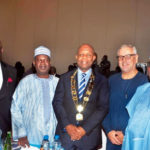PRESIDENT Muhammadu Buhari submitted his ministerial nominees list to the National Assembly consisting 43 names; 36 men and seven women only. The representation of women in the said list is about 16 per cent which is very low and not a fair representation of women in this government.
For a government that has always promised inclusive governance one would have expected at least a 30 per cent women representation in the proposed cabinet. In a world where technology is making rapid strides and barriers of gender are becoming dismantled, governance is enriched when women are given good representation.
According to the 2016 World Bank report, the population of women in Nigeria is said to be 49.33 per cent, which is almost half of its population. Nations are poorer if they fail to tap the full potential of half of its population. A good and fair representation and participation of women in governance is part of achieving genuine democracy, there can be no real democracy when half of the population doesn’t have a good or fair participation in governance.
It has been said that where there is a good representation of women decision-makers issues previously unaddressed can be priorities, women involvement in governance ensures that a wider range of perspective is brought to bear in policy making and service delivery.
A country serious about equitable and sustainable development will ensure a good participation of women in governance and policy implementation. As we aim for a stable democracy, higher levels of women representation in government should be aimed for. It has also been proved that an increase in the number of women in public life results in lower levels of inequalities and increased confidence in national governments. Figures show that increase in the number of women cabinet ministers is associated with a rise in public health spending across many countries.
It is pertinent that governments should reflect the diversity of societies they represent to guarantee a balanced perspective which enables an inclusive approach to policy making and service delivery. If we are to build sustainable routes out of poverty, then women must be full beneficiaries and contributors to the country’s progress.
- Olayemi Olaniyi (Mrs)
anigeriathatworks@gmail.com






